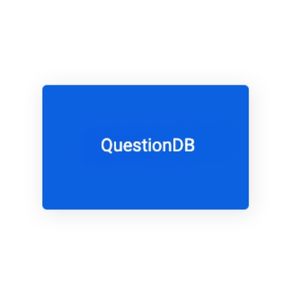Keyword research lays the foundation of your website’s ranking.
Top-performing keyword research tools provide quality keyword data that improves search volume and traffic to your site.
More traffic means more potential for revenue. It’s why businesses invest in them.
There are numerous options available online. Some are free, and others are paid.
Today’s list will highlight a combination of the best free keyword research tools and the premium ones tailored for different purposes.
- The Best Keyword Research Tools (Overview)
- What Are the Best Keyword Research Tools?
- 1. Google Keyword Planner – Best for Paid Keywords
- 2. Moz Keyword Explorer – Smart and Fast Keyword Researcher
- 3. Ahrefs Keyword Explorer – Linkbuilder’s Choice
- 4. Semrush – SEO Tool for Experts
- 5. Keyword Surfer – Handy Chrome Extension for Instant Keyword Search
- 6. Google Trends – Google’s Trendiest Terms With a Click
- 7. Google Search Console – Easy Monitoring of Google’s Search Performances
- 8. Jaaxy – Keywords Explorer for Affiliate Marketers
- 9. Serpstat – Best in Competition Analysis
- 10. QuestionDB – Top Questions Asked Around the Globe
- 11. Ubersuggest – Multilingual Keywords Explorer
- 12. Soovle – Keyword Generator With a Classic Feel
- Factors to Consider When Choosing the Best Keyword Research Tools in 2023
- Frequently Asked Questions
- Wrapping Up
The Best Keyword Research Tools (Overview)
We’ve tested out several tools and scoured reviews from users to come up with the best picks.
We’ve included an overview of our top picks below. For detailed information on each pick, scroll down.
- Google Keyword Planner – Best for Paid Keywords
- Moz Keyword Explorer – Smart and Fast Keyword Researcher
- Ahrefs Keyword Explorer – Linkbuilder’s Choice
- Semrush – SEO Tool for Experts
- Keyword Surfer – Handy Chrome Extension for Instant Keyword Search
- Google Trends – Google’s Trendiest Terms With a Click
- Google Search Console – Easy Monitoring of Google’s Search Performances
- Jaaxy – Keywords Explorer for Affiliate Marketers
- Serpstat – Best in Competition Analysis
- QuestionDB – Top Questions Asked Around the Globe
- Ubersuggest – Multilingual Keywords Explorer
- Soovle – Keyword Generator With a Classic Feel
What Are the Best Keyword Research Tools?
Let’s dive into the list of top keyword research tools that’ll help you improve your site’s organic search and search volumes.
1. Google Keyword Planner – Best for Paid Keywords
Why We Suggest This
Google’s keyword planner has a Keyword Ideas tool that allows you to view related keywords to a single term. Results include search volume data, impressions, and historical records of how much advertisers paid for that keyword.
- Best For: Pay-per-click (PPC) strategies and paid marketing efforts
Google’s keyword planner is part of the search engine’s advertising platform, meaning a Google ads account is required.
Setting up the account is free.
Once active, you can use Google Keyword Planner to get keyword suggestions based on a topic.
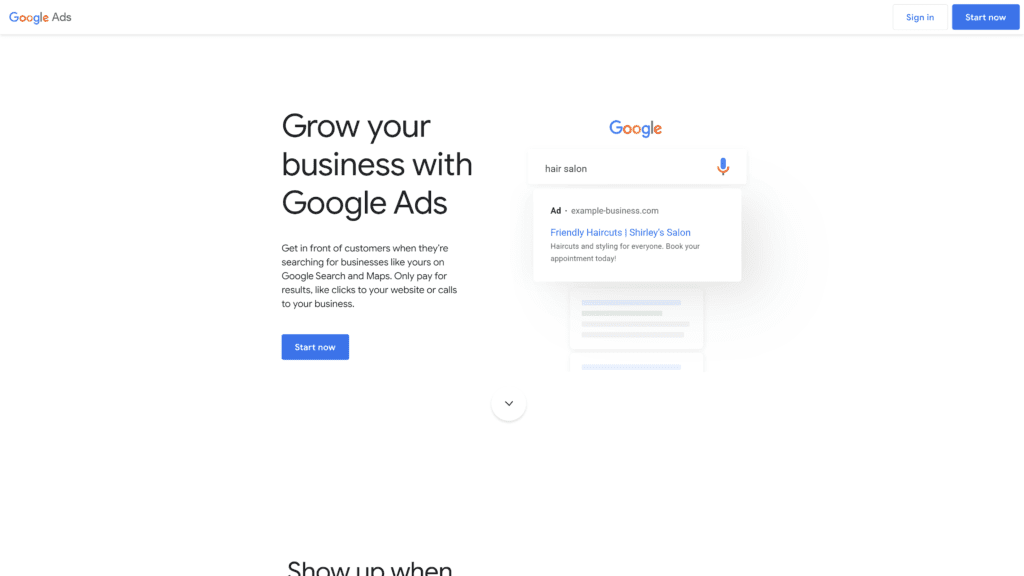
The tool’s Keyword Ideas feature allows you to view related keywords to a single term.
Results include search volume data, impressions, and historical records of how much advertisers paid for that keyword.
The keyword planner also has the refine keyword tool that helps you narrow down results based on specific filters.
For instance, if you’re searching for ‘oily hair,’ you’ll have the option to refine search results by condition, hair type, symptoms, and more.
It’s important to mention that since this tool is designed for Google ads, the keyword search results are focused more on pay-per-click rather than organic data.
This means keyword data from this tool will best benefit paid advertising campaigns.
Pricing
Free, but will require you to set up a Google Ads account, which asks for your billing information.
Best For
Pay-per-click (PPC) strategies and paid marketing efforts.
2. Moz Keyword Explorer – Smart and Fast Keyword Researcher
Moz’s Keyword Explorer tool combines aesthetics and intuitive functionality in one.
This tool lets you view a keyword’s monthly search volume, keyword difficulty, organic click-through rates, analysis reports, and similar keyword suggestions.
Its Priority Score feature tells you whether a keyword is worth ranking based on search term history and its relevance to a preset My Score rating.
This means you can easily eliminate keywords that have low relevance to your business and focus your efforts on those that’ll help you rank high in search engines.
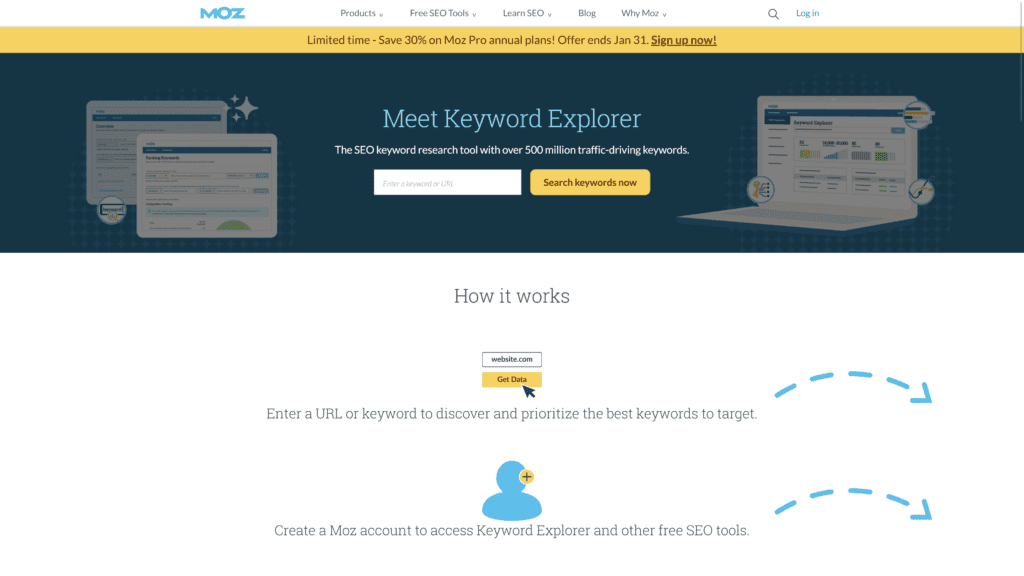
While it’s unable to provide details like SERP position history, Moz keyword explorer remains a strong contender for providing the smartest relevant keywords results you won’t find on its top competitors.
This attribute ensures you get targeted keywords related to your audience’s search queries.
Pricing
Has a 30-day free trial, proceeds with $99 per month
Best For
Beginners to intermediate marketers who want straightforward results minus the technicalities.
3. Ahrefs Keyword Explorer – Linkbuilder’s Choice
Nothing beats Ahrefs Keyword Explorer in terms of link-building and backlink analysis.
This keyword planner has the most expansive backlink database worldwide, which helps professional marketers get the nitty-gritty of paid and organic search results for content marketing.
Ahref’s database is updated monthly, ensuring users get new data from pages across the web.
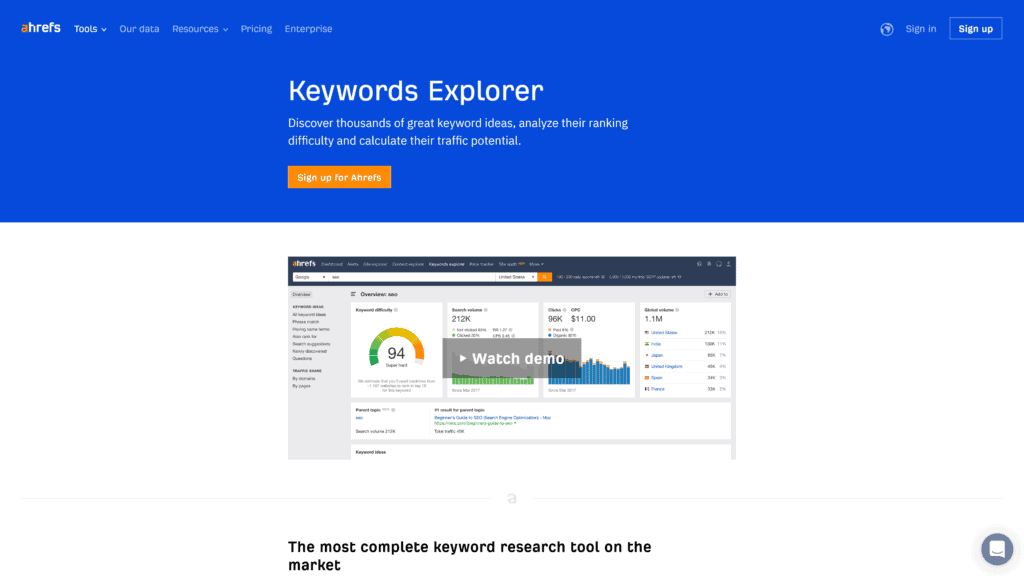
One of its key features is Keyword Difficulty, which gives you precisely the required backlinks to your site to land it on Google’s first page.
Whereas most tools only give vague tagging like ‘Easy’ or ‘Difficult,’ Ahrefs data in numbers is a game-changer in getting specific organic traffic insights.
This keyword tool also provides a comprehensive SERP analysis report, allowing you to understand the factors that affect a page’s ranking.
These factors include on-page optimization, internal and external links, and page speed.
Its innovative click metric is also great for analyzing search history and identifying how many clicks are paid or organic.
Pricing
Starts at $99 per month.
Best For
Medium to large-size agencies that need all-purpose SEO tools.
4. Semrush – SEO Tool for Experts
Semrush is built to provide all-out support for search engine optimization strategies, making it an essential tool for anyone serious about SEO.
That being said, Semrush’s paid version may not be for beginners.
The sheer volume of functionalities it offers can be overwhelming for starters.
It’s packed with features like the Keyword Magic Tool, which finds related keywords you won’t often think of when doing a manual search.
Linking this to Google Analytics unlocks more features you can use to uncover organic keywords.
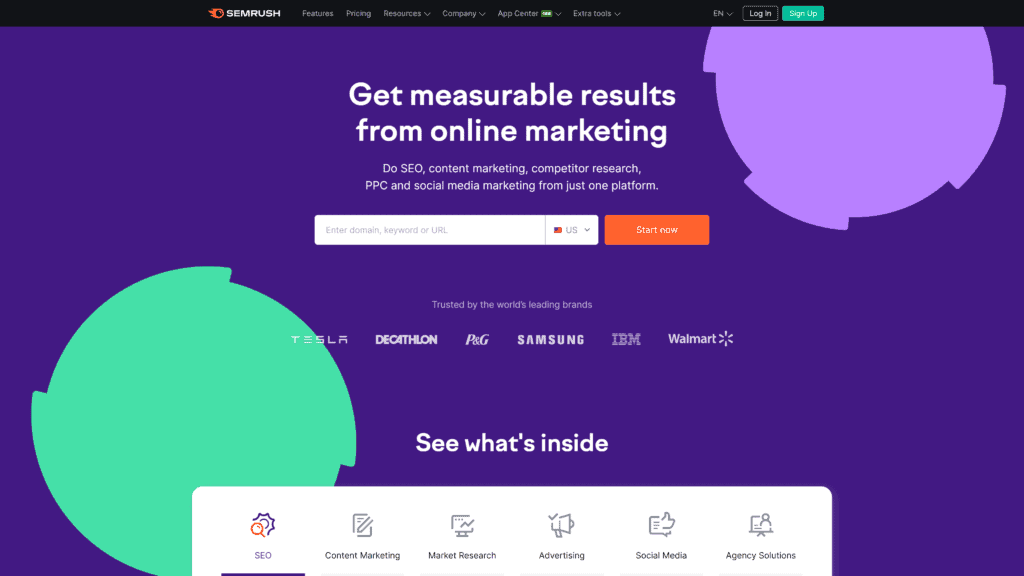
This keyword tool can also show you terms already ranking on your competitors’ sites, making it easier to plan your content ideas to ace keyword competition.
If you’re unsure of what to search for, Semrush’s Phrase Match feature provides a comprehensive keyword list of long-tail keywords relevant to the topic you provide.
Once you’ve gathered keywords for your site’s content, you can use Semrush’s SEO content template tool to create a content brief.
This serves as your outline for writing posts, ensuring their format and hierarchy are at par with content ranking high on search databases.
Its position-tracking functionality also helps identify high-ranking keywords, including your competitors’ keyword profiles.
Pricing
It has a free version for basic functions.
The paid version offers a 7-day free trial and starts at $119.95 monthly.
Best For
Advanced SEO users, large agencies, and PPC experts.
5. Keyword Surfer – Handy Chrome Extension for Instant Keyword Search
Keyword Surfer is a free Chrome extension that generates keyword results for related queries.
This free tool helps find Google-backed results in an initial query and similar keywords based on location.
You can toggle the global search volume on and off to narrow down your search intent.
Once installed, you’ll see a keyword’s monthly searches, the number of times it appears on a page, and a Title Changed indicator below the title, signaling that Google changed its title tag link.

You can also save the keywords generated from your search and download them as a CSV file for future reference.
If you’re using this free keyword tool to assist you in writing, its AI article generator is a plus.
It gives you structural suggestions or outlines of how you should compose your article to reflect the hierarchy that search engines rank similar posts.
Pricing
Free extension.
Best For
Anyone who wants a quick keyword data result directly from Google.
6. Google Trends – Google’s Trendiest Terms With a Click
If you need to know the trendy keywords, look no further than Google Trends.
It’s a free tool designed to capture the most popular keyword hits over time in any location.
And since it’s powered by Google, the world’s largest search engine, you can bet the data is timely and legit.
Google Trends is great for helping you with seasonal campaigns, as it displays keyword popularity for a specified time frame.
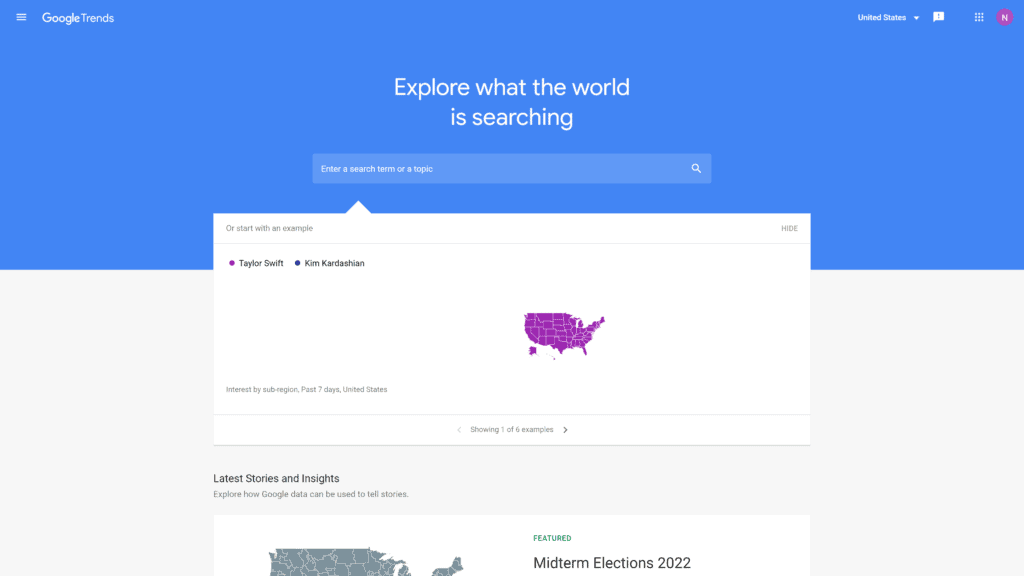
Viewing the Related Queries section helps you identify potential topics that are gaining popularity among your target audience.
Google Trends also shows reliable search volumes, allowing you to view the increase or dwindling attention to a topic.
One keyword can have more Google search results in 5 years but might show lesser searches for the previous year compared to rising related searches.
Knowing this help you plan ahead and pattern your content ideas to reflect trendy keyword ideas.
Moreover, Google Trends can also capture keywords’ popularity on YouTube.
So if your strategy’s focused on video content, knowing what’s ‘in’ can help boost your post’s popularity.
Keeping an eye on Google’s trendy topics gives you a heads-up on things that’ll likely go big in the coming months, thus allowing you some time to pattern your SEO strategy to fit the consumption demand.
Pricing
Free.
Best For
Anyone who needs to know the trendy keywords in real time.
7. Google Search Console – Easy Monitoring of Google’s Search Performances
Google Search Console is a keyword research tool best for generating blog post ideas based on existing ones.
This tool shows you keywords you already rank for but have yet to focus on.
For instance, a keyword can have many impressions but a low position ranking.
This tells you that the content is enticing enough to get people to click.
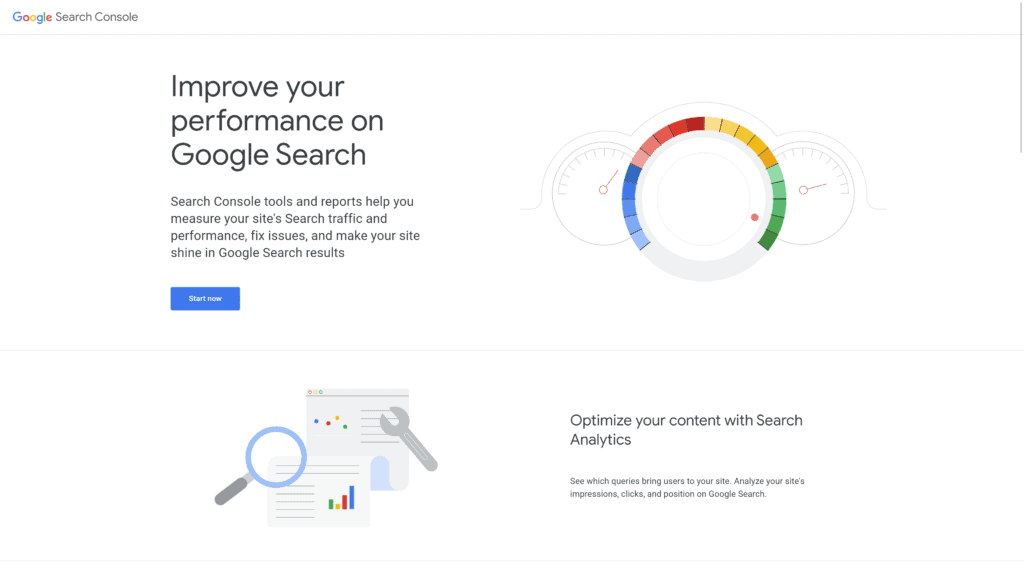
However, your site has very little similar content featuring that keyword.
This becomes your opportunity to craft posts centering on that term instead of finding new keywords from scratch.
Google Search Console is compatible with Google Analytics, and linking them gives you even better results in keyword research.
Details like the number of clicks, impressions, click-through rates, and position are displayed in columns for easy tracking.
Pricing
Free.
You only need a website.
Best For
Anyone looking for opportunity keywords from those existing ones on their website.
8. Jaaxy – Keywords Explorer for Affiliate Marketers
Jaaxy is the most straightforward keyword research tool on our list.
You need to enter the term or topic in the search bar, and it’ll give you all the relevant keywords along with search volumes, impressions, and traffic.
Jaaxy taps into its rich database of fresh keywords that help you discover niche markets often missed out by some tools.
With its exclusive competition tracking tool, SiteRank, Jaaxy can provide users with comprehensive ranking insights.
You can set the frequency on which you test rank your site against competitors, and the tool notifies you of the result within the platform.
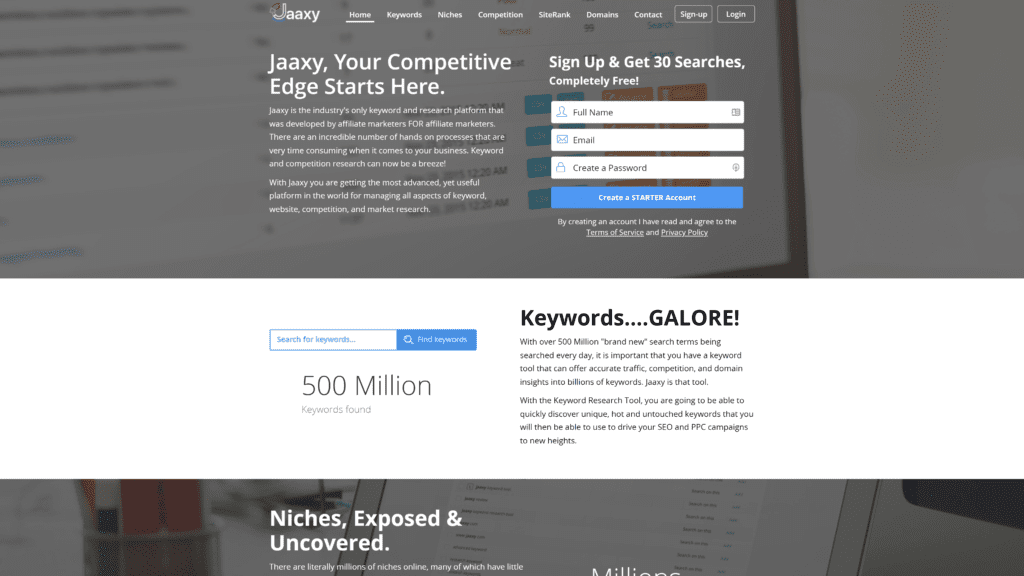
What sets this keywords explorer apart from the others is its access to affiliate marketing info that you can feature in your content.
You can even join them if you’d like.
They have several sources for affiliate programs, including Digital River, ClickBanks, Link Share, and Commission Junction, which means more program choices.
Jaaxy’s Quoted Search Result feature is excellent at providing information on websites competing to rank a specific keyword.
Pricing
$49 per month.
Best For
Marketers looking for a straightforward keyword research tool with access to affiliate marketing programs.
9. Serpstat – Best in Competition Analysis
Serpstat excels in competitive analysis and doubles as a budget-friendly keyword research tool.
It provides data on keyword trends, group keywords, and related terms to help you create content with chances of ranking higher on search engine results pages.
The main highlight of this tool is its intuitive way of providing data about your direct competitors.
It features a Competitors Graph page that shows colorful bubbles representing your competition.
You’ll also see those keywords you share with your competitors and view which of them are targeted by organic or paid ads.
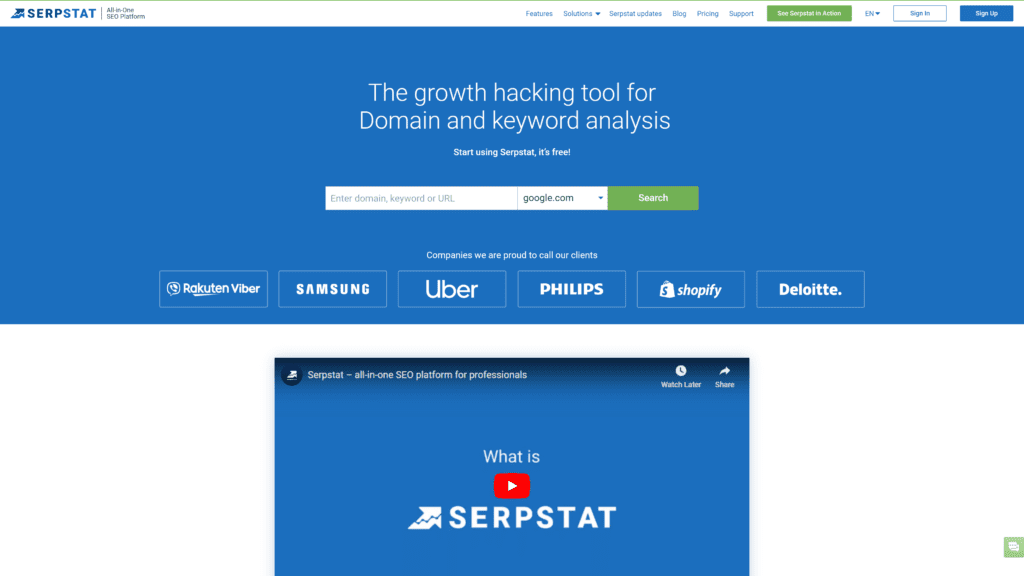
Pricing
Starts at $55 per month.
Best For
Freelance SEO specialists and small agencies who want to focus on market competition.
10. QuestionDB – Top Questions Asked Around the Globe
Are you looking for keyword ideas to feature in your next article? QuestionDB can give you extensive options.
This tool works like a reversed Q&A portal where you input seed keywords, and the tool gives you a list of specific questions people around the web are asking about it.
For instance, searching for ‘Keyword Research’ generates results like, ‘Am I doing my keyword research wrong?’
Since QuestionDB’s results are sourced from forums like Reddit and Quora, you can trust those questions to be issues that real audience is asking.
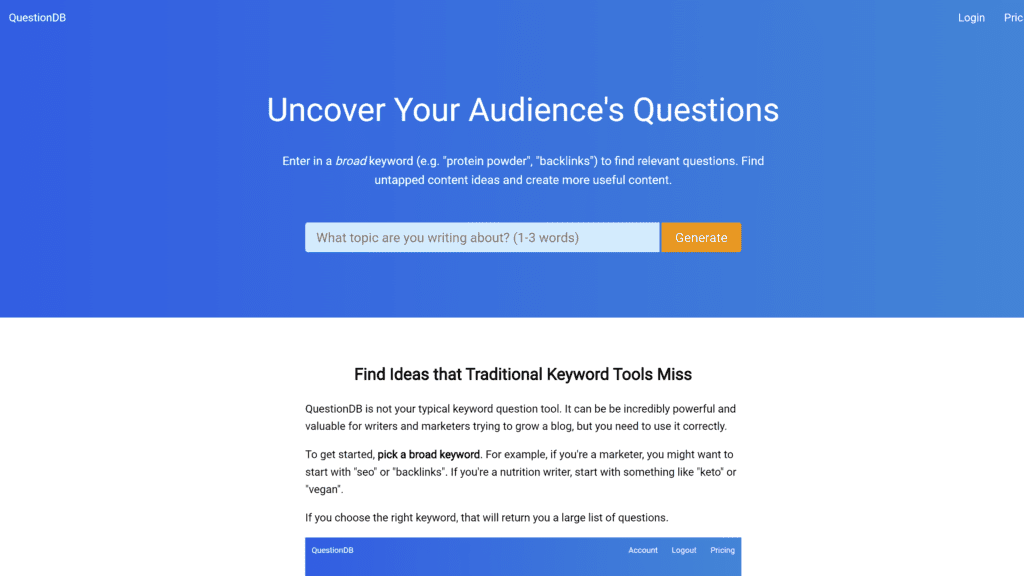
Plus, there’s a source link to all sections that you can use to view the whole thread relating to that topic.
One of the best things about this tool is the ability to sort results by popularity.
This leads you to topics with the highest search volume.
Pricing
Free for a maximum result of 50, paid plans start at $15 per month with unlimited results.
Best For
Content writers and SEO specialists looking for blog topics.
11. Ubersuggest – Multilingual Keywords Explorer
Ubersuggest is another tool to research keywords and get straightforward results.
It works similarly to Google autocomplete suggestions, where you start typing and get drop-down suggestions of potential search matches.
Its free version is limited to three keyword searches per day and provides you with a keyword overview that includes search volume, SEO difficulty, paid difficulty, and cost per click (CPC).
Ubersuggest also gives insights on top pages for a keyword, including the number of social shares for each page.
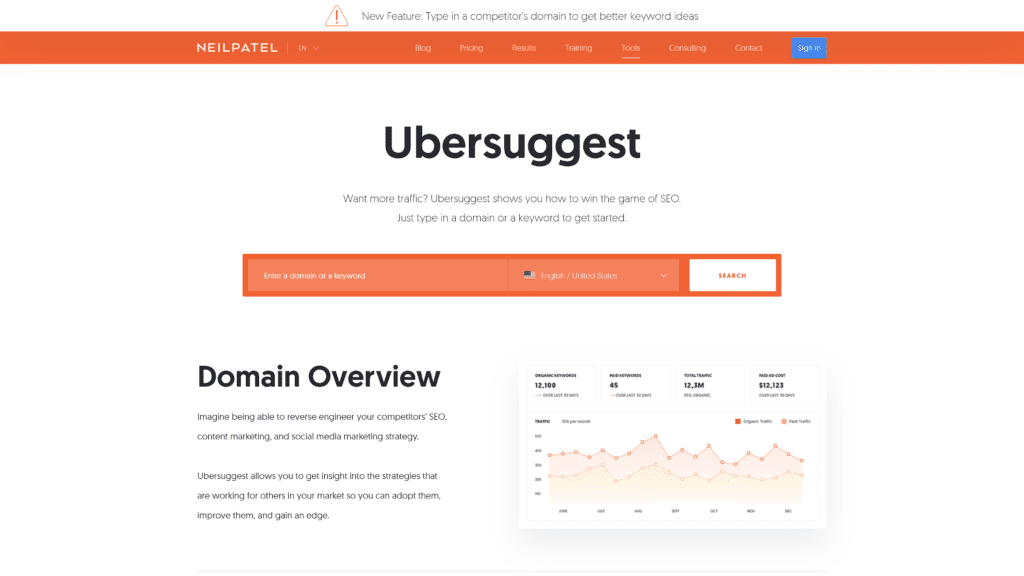
Other page details like backlinks and estimated site visits are also provided.
You can enter a seed keyword and adjust filters to comparison, question, and preposition variations to get more specific results.
One feature that sets this tool apart from the rest is its availability in multiple languages, which makes it highly accessible for localized websites.
Pricing
Free but limited to three keyword searches a day, and paid plans start at $12 per month.
Best For
Content marketers and freelancers.
12. Soovle – Keyword Generator With a Classic Feel
Why We Suggest This
Soovle pulls out keyword suggestions from the world’s biggest search databases like Google, Bing, Youtube, Amazon, and more. You don’t even need to shift tabs or click on links to find keywords.
- Best For: Content writers and marketers looking for fresh topics or ideas to write about
Soovle is an easy-to-use target keyword search tool with a classic feel.
It pulls out keyword suggestions from the world’s biggest search databases like Google, Bing, Youtube, Amazon, and more.
You don’t even need to shift tabs or click on links to find keywords.
You type terms or phrases in the search box, and all the top suggestions start to appear over the platforms’ logo on that same page.

One cool thing about this keyword planner is the ability to save word suggestions with a simple drag and drop.
This helps content managers track new keywords for future entries to a site’s blog section.
Pricing
Free.
Best For
Content writers and marketers looking for fresh topics or ideas to write about.
Factors to Consider When Choosing the Best Keyword Research Tools in 2023
Considering the similarities of features shared by some paid keyword research tools and free ones, you’ll need to be clear on what you need from them.
Below are factors that can help you decide which SEO keyword research tool best fits the content strategy you have in mind.
Keyword Research Features
How extensive is your need for keyword suggestions?
Most free keyword research tools can give you comprehensive results, but they lack advanced features like in-depth ranking difficulty analysis and position tracking only accessible through paid tools.
You can start with a free version to familiarize the basics, but if you’re serious about getting competitive search engine results, subscribing to a paid keyword planner is the best way.
Ease of Usage
The best keyword research tools are designed to make search marketing easier.
However, software navigation isn’t a piece of cake for many.
When finding a tool, it helps to try it out before subscribing.
Several research tools we’ve listed offer limited-time free trials that you can maximize by studying how it works.
Find something you’re comfortable using.
Going for something complex might overwhelm and discourage you from using most of its features.
Cost
Free keyword research tools are your best bet for basic keyword ideas search.
But if the goal is to establish domain authority for your site, you must be ready to invest in tools that land you on Google’s first page.
Paid research tools are costly, and most, if not all, have monthly fees specific for a single user and not an entire enterprise.
Apart from the features, take time to assess if your budget covers the cost of your chosen tool.
Otherwise, work on listing alternatives you can start with and scale later.
Product Reviews
How do other users find the product?
Keyword research tools with the best features and functions will satisfy marketers, and this will show in their reviews.
Go for a keyword planner with a high star rating and positive online reviews to be on the safe side.
Also, you’d want to check the feedback for the tool’s customer support response.
Not every software has a dedicated phone line to answer your queries in real time.
Some may take up to 72 hours, which can be a deal-breaker, especially for large agencies with huge clientele.
Built-In Content Marketing Features
This is optional, but since you’re paying for the service, you might as well look into the other things you’re getting when signing up.
Add-on features you’d want to look out for include social media management tools, listing management, marketing analysis, and SEO content template tool.
Frequently Asked Questions
Are Premium Keyword Research Tools Worth It?
It’s worth it if you’re serious about your SEO strategy and willing to put in the work.
Efficient use of these tools is proven to drive organic search traffic, catapulting pages to Google’s first page.
However, results don’t happen overnight, even with the best tool at work, so you’ll need to set proper expectations.
You still need to work on incorporating the tool into your existing campaign and using it to improve your content delivery.
What Is the Best Keyword Research Tool?
There’s no official record naming a single tool that beats the others.
The best tool is the one that gives you the features you require.
However, you can use any of the product’s unique selling propositions to base their performance quality as affirmed by the users.
For instance, if you’re after backlink data to enhance your SEO strategy, then Ahrefs is a worthy choice.
It’s more costly than the others but has the best database for building links.
How Much Should I Spend on Keyword Research?
This is purely up to you.
If you have the budget, the skills, and a large website to run, Semrush should be on top of your list.
Yes, it’s expensive, but with the reports you get to keep your content strategy at pace with your competitors, this could be a worthy investment.
Wrapping Up
Now that you have a list of keyword research tools, it’s time to finalize your pick.
Decide what you need and how much you’re willing to spend.
From there, you can identify which of our featured items fit your requirements.
And remember, results can take time, so set proper expectations as you choose your keyword research tool.











